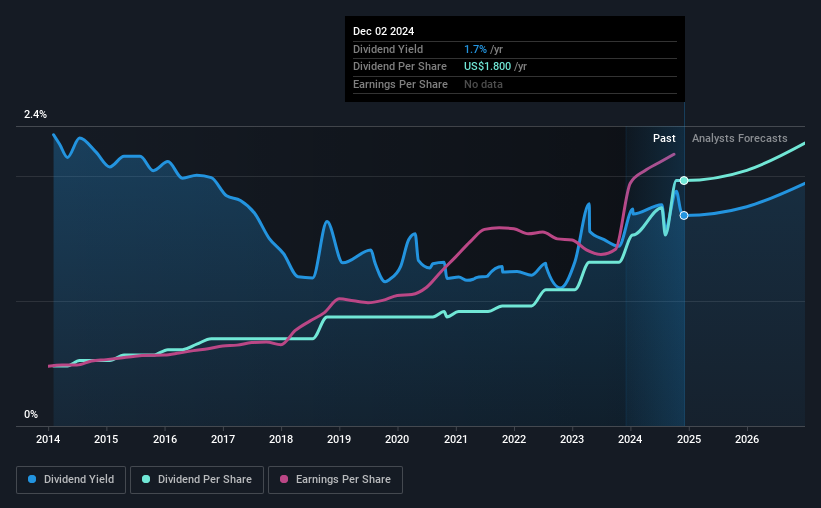- United States
- /
- Banks
- /
- NasdaqCM:BFC
Bank First (NASDAQ:BFC) Is Paying Out A Larger Dividend Than Last Year
The board of Bank First Corporation (NASDAQ:BFC) has announced that it will be paying its dividend of $0.45 on the 6th of January, an increased payment from last year's comparable dividend. Although the dividend is now higher, the yield is only 1.7%, which is below the industry average.
Check out our latest analysis for Bank First
Bank First's Earnings Will Easily Cover The Distributions
While yield is important, another factor to consider about a company's dividend is whether the current payout levels are feasible.
Bank First has established itself as a dividend paying company with over 10 years history of distributing earnings to shareholders. Using data from its latest earnings report, Bank First's payout ratio sits at 17%, an extremely comfortable number that shows that it can pay its dividend.
Over the next 3 years, EPS is forecast to fall by 6.8%. Fortunately, analysts forecast the future payout ratio to be 29% over the same time horizon, which is in the range that makes us comfortable with the sustainability of the dividend.

Bank First Has A Solid Track Record
The company has a sustained record of paying dividends with very little fluctuation. The annual payment during the last 10 years was $0.44 in 2014, and the most recent fiscal year payment was $1.80. This means that it has been growing its distributions at 15% per annum over that time. It is good to see that there has been strong dividend growth, and that there haven't been any cuts for a long time.
The Dividend Looks Likely To Grow
Investors could be attracted to the stock based on the quality of its payment history. It's encouraging to see that Bank First has been growing its earnings per share at 17% a year over the past five years. With a decent amount of growth and a low payout ratio, we think this bodes well for Bank First's prospects of growing its dividend payments in the future.
Bank First Looks Like A Great Dividend Stock
Overall, we think this could be an attractive income stock, and it is only getting better by paying a higher dividend this year. The distributions are easily covered by earnings, and there is plenty of cash being generated as well. We should point out that the earnings are expected to fall over the next 12 months, which won't be a problem if this doesn't become a trend, but could cause some turbulence in the next year. All in all, this checks a lot of the boxes we look for when choosing an income stock.
Investors generally tend to favour companies with a consistent, stable dividend policy as opposed to those operating an irregular one. However, there are other things to consider for investors when analysing stock performance. Taking the debate a bit further, we've identified 1 warning sign for Bank First that investors need to be conscious of moving forward. Is Bank First not quite the opportunity you were looking for? Why not check out our selection of top dividend stocks.
Valuation is complex, but we're here to simplify it.
Discover if Bank First might be undervalued or overvalued with our detailed analysis, featuring fair value estimates, potential risks, dividends, insider trades, and its financial condition.
Access Free AnalysisHave feedback on this article? Concerned about the content? Get in touch with us directly. Alternatively, email editorial-team (at) simplywallst.com.
This article by Simply Wall St is general in nature. We provide commentary based on historical data and analyst forecasts only using an unbiased methodology and our articles are not intended to be financial advice. It does not constitute a recommendation to buy or sell any stock, and does not take account of your objectives, or your financial situation. We aim to bring you long-term focused analysis driven by fundamental data. Note that our analysis may not factor in the latest price-sensitive company announcements or qualitative material. Simply Wall St has no position in any stocks mentioned.
About NasdaqCM:BFC
Flawless balance sheet with high growth potential and pays a dividend.
Similar Companies
Market Insights
Community Narratives



